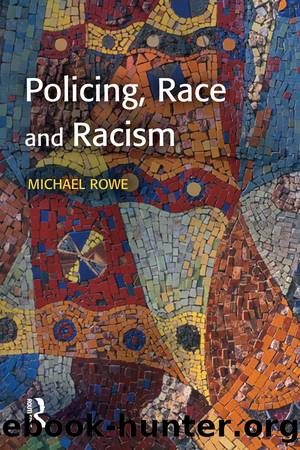Policing, Race and Racism by Mike Rowe

Author:Mike Rowe [Rowe, Mike]
Language: eng
Format: epub
Tags: Social Science, Criminology
ISBN: 9781135996505
Google: wsPiTsFD4ooC
Publisher: Routledge
Published: 2012-12-06T03:41:37+00:00
Discretion, street crime and measuring police performance
At the heart of debates about police use of stop and search is the issue of discretion. As mentioned briefly above, a long-standing feature of attempts to manage the routine activity of police officers when out on the beat is the difficulty faced by those responsible for police governance arising from the low visibility of much police work. Elsewhere in this book the roles that training, disciplinary procedures, complaints and accountability systems variously play in regulating the actions taken by officers as they interact with the public are discussed. Much of the effort expended to control officersâ behaviour in relation to stop and search has employed the development of regulations and monitoring procedures.
The discretion available to officers in terms of their powers to stop and search is considerable for a number of reasons. Even though PACE tightened the requirement for police officers to have reasonable suspicionbefore using stop and search and the codes of practice stipulate in some detail how this ought to be applied, it remains the case that such guidelines require interpretation in a myriad of circumstances. In such situations informal practices and norms influence the application of formal regulations and the working knowledge of policing provides a basis for officersâ action. The nature and impact of police subculture has been discussed elsewhere in this book, but machismo and racism have been much noted in studies into this issue and the concern has been that these filter officersâ discretion so that black people and other minorities come to be regarded as police âpropertyâ. Since most police officers are white males, the extent to which they have contact with minority communities in a non-policing environment has been found to be limited and so the process of stereotyping becomes reinforced to the extent that black people, and other groups, are only encountered in crime-related contexts. Against this background, there is only a short mental leap to be made before officers use stereotypes to order and make sense of the complex shifting environment in which they work (Rowe, 1995).
Interestingly, though, FitzGeraldâs (1999) study of stop and search in London found that officers tended to deny that they implemented their powers on the basis of their own discretion. Instead, it was argued, such decision-making was removed from the individual officer who responded instead to crime reports provided to them or to information supplied by the public, described by FitzGerald as âlow-discretionâ stop and searches. However, FitzGeraldâs analysis of data relating to stop and searches suggested that officersâ perceptions were not borne out since approximately three-quarters of these encounters were implemented at the discretion of the police officer. Another explanation FitzGerald was given by officers was that they tended to use their powers to target âprominent nominalsâ, i.e. individuals who were âknown offendersâ. Again, though, FitzGeraldâs (1999: 41) analysis sheds doubt on this explanation of officersâ use of stop and search:
In interviews, police officers constantly asserted that their patterns of search simply mirrored patterns of offending, as
Download
This site does not store any files on its server. We only index and link to content provided by other sites. Please contact the content providers to delete copyright contents if any and email us, we'll remove relevant links or contents immediately.
The 1921 Tulsa Race Massacre by Chris M. Messer(347)
Introduction to Criminal Justice - A Balanced Approach by Brian K. Payne Willard M. Oliver Nancy E. Marion(291)
Russia's Sakhalin Penal Colony, 1849â1917 by Andrew A. Gentes(274)
Punishing the Poor The Neoliberal Government of Social Insecurity by Unknown(272)
The History of Newgate Prison by Jowett Caroline;(248)
Serial Killers America and UK - 2 BOOKS IN 1 by Clark Matthew(241)
A History of Police and Masculinities, 1700-2010 by David G. Barrie Susan Broomhall(219)
Restorative Justice in Transitional Settings by Kerry Clamp(197)
Culture, Crime and Punishment by Ronald Kramer(184)
Dangerousness, Risk and the Governance of Serious Sexual and Violent Offenders by Karen Harrison(180)
Organized Crime and Corruption Across Borders by T. Wing Lo Dina Siegel Sharon I Kwok(177)
Routledge Handbook on Immigration and Crime by Holly Ventura Miller Anthony Peguero(176)
The Real CSI by Kate Bendelow(174)
Cops, Cameras, and Crisis by Michael D. White Aili Malm(174)
Policing Gender, Class And Family In Britain, 1800-1945 by Linda Mahood(169)
Women Exiting Prison by Bree Carlton Marie Segrave(165)
A Theory of African American Offending by James D. Unnever Shaun L. Gabbidon(163)
Using Murder by Philip Jenkins(161)
Losing Legitimacy by Gary Lafree(159)
